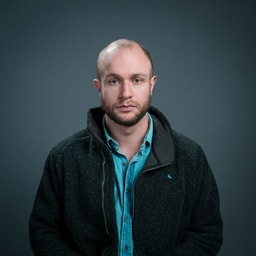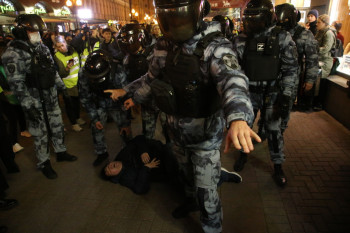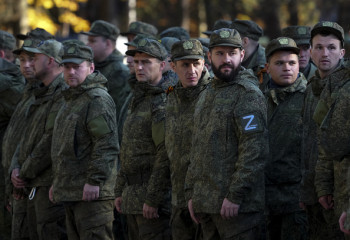Meet the Chechens fighting Russia in Ukraine

In the Kyiv office of the Dzhokhar Dudayev Battalion, two flags hang on the wall next to each other: the yellow-and-blue flag of Ukraine and the green-white-and-red flag of the Chechen Republic of Ichkeria.
The battalion, named for the first president of the short-lived Chechen republic, Dzhokhar Dudayev, who led the republic’s drive for independence from Russia before his assassination in 1996, has been fighting for Ukraine since the start of Russia's invasion in 2014.
"Chechnya lost its noble sons here – they were fighting for Ukraine," said one of the Chechen fighters who goes by the nom-de-guerre Thor. Thor and his fellow servicemen asked to be identified by their nom-de-guerre to avoid retaliation against their families in Chechnya.
Thor is in his early-to-mid 40s and has been fighting for Ukraine for over eight years. "I've seen everything," he says.
Despite the battalion defending Ukraine and the loss of life that has come with it, prejudice against Chechens in Ukraine remains an issue.
The battalion’s members are less famous than the other class of Chechens fighting in Ukraine – kadyrovtsy, named after Chechen strongman Ramzan Kadyrov. Fighting as part of Russian forces, Kadyrov’s Chechens are notoriously merciless. Many reports suggest they participated in the mass murder of civilians during the occupation of Bucha and other towns around Kyiv back in the spring.
Because of the reputation of Kadyrov’s fighters, civilians often don't trust the Chechens fighting for Ukraine within the Dudayev Battalion.
"Unfortunately, Russian propaganda has strongly impacted people's minds in Ukraine," said Thor. "Many people expect aggression from us and think that we are some kind of barbarians."
The members of the Dzhokhar Dudayev Battalion have nonetheless tied themselves to Ukraine and its people.
"Our president is (Volodymyr) Zelensky, and our commander-in-chief is (Valerii) Zaluzhny," said Maga, a young soldier with the battalion. "And what we are doing now together, taking Izium, liberating Lyman – we are proving that Ukraine is the second army in the world. Ukraine has grown, and it’s moving in the right direction."
"This is all possible because we are free people," said Maga, referring to everyone fighting for Ukraine – Ukrainians and Chechens alike.

Continuation of decades-long struggle
Members of the Dzhokhar Dudayev Battalion fight for Ukraine, thinking of their native Ichkeria, the name given to pro-independence Chechnya crushed by Russian President Vladimir Putin with the help of infamous Chechen strongman Kadyrov.
Russia waged two wars to prevent Chechnya from gaining independence after the fall of the Soviet Union in 1991. The first, launched by then-President Boris Yeltsin, lasted from 1994-1996. The second, started under Yeltsin but fought mainly by his successor Putin, began in 1999. Its combat phase ended in 2000, but the insurgency phase continued until 2009.
“The fight for independent Ichkeria and now for independent Ukraine are part of one whole,” says Thor.
Ukraine’s parliament recognized the Chechen Republic of Ichkeria as temporarily occupied by Russia on Oct. 18.
"Today, it is a struggle that started back in Chechnya and continues to this day for us," he added.
Many Ukrainians fought for Chechnya against Russia in the 90s, which is well remembered among the Chechens now fighting for Ukraine.
Another Chechen battalion is currently fighting under Ukraine’s command–the Sheikh Mansur Battalion, also named after a legendary Chechen leader, but one who fought the Russian Empire in the 18th century.
A deeply personal story
Both Thor and Maga are experienced fighters.
Maga, 29, began fighting alongside Ukrainian forces back in 2016 when the war was localized along the front lines of partially-occupied oblasts of Donetsk and Luhansk.
When Russia launched a full-scale invasion on Feb. 24, he took part in sabotage and reconnaissance activity to help stop Russia's attempts to seize Kyiv from the north.
After Russia retreated from northern Kyiv Oblast, his group was deployed in the direction of Kharkiv and Izium, a crucial hub to control the northeastern region.
A part of the group is now deployed near Bakhmut in Donetsk Oblast, the scene of intense fighting. Since July, Russia has deployed a massive amount of its forces there, including Wagner mercenaries, to try and sack the strategic city.
"It’s just hell there — there are extremely fierce battles there every day," Zelensky said about the ongoing battles near Bakhmut.
Thor has been fighting in Ukraine since the very beginning of Russia's invasion in 2014.
"In this regard, this is a deeply personal story," he says. He has been in the country for 14 years.
Thor fought in the grueling battle of Debaltseve in 2015, when Ukrainian forces were overwhelmed by the Russian military, including battle-hardened mercenaries from the Wagner Group.
His battalion paid a costly price against Russia and its proxies in Donetsk and Luhansk.
Isa Munayev, a commander who fought in the Chechen Wars and lived in exile in Denmark before 2014, was killed in the Battle of Debaltseve. He was the primary founder of the Dudayev Battalion. Since then, the commander of the battalion has been Adam Osmayev.
Osmayev was arrested in 2012 in Ukraine when pro-Russian President Viktor Yanukovych was still in power for allegedly preparing a plot to assassinate Putin. He was released from prison in 2014 after Yanukovych fled to Russia following the EuroMaidan Revolution.
Osmayev has survived several assassination attempts in Ukraine, including one that killed his wife in 2017 near Kyiv. A few days after the full-scale Russian invasion began in February, Osmayev called on Chechens to support the Ukrainian resistance.
Thor says that through fighting alongside Ukrainians, he feels he has “become Ukrainian.”
"You see what the Ukrainians are doing, how they are turning the world upside down," he said. "It’s fantastic."

A common cause
The Dzhokhar Dudayev Battalion may have been fighting for Ukraine since the beginning of Russia's war in 2014, but it was with the full-scale invasion in 2022 that the similarities between Ukraine and Chechnya's experiences with Russian aggression really came into the spotlight.
When Russia pounded Mariupol mercilessly for over a month in March, taking the city street by street in a brutal siege and killing likely tens of thousands of civilians, comparisons to the siege of the Chechen capital of Grozny in 1999 wrote themselves.
"The Chechens (in Grozny) were basically in the same position as the Azov Battalion (that was defending Mariupol)," said Thor.
Outnumbered and outgunned, the Chechens were able to eventually win the Battle of Grozny and the First Chechen War.
Freedom of nations
Far beyond the borders of Ichkeria, Russia's invasion of Ukraine has rekindled the discussion on national liberation for the dozens of other groups whose homelands remain inside the Russian Federation.
Soldiers from Chechnya and other ethnic republics in Russia like Dagestan, Tuva, and Buryatia make up a disproportionately large component of the Russian army in Ukraine, as Moscow looked to recruit soldiers from these poorer, more marginalized regions rather than disrupt the illusion of normality in the large cities, such as Moscow and St. Petersburg.
"Russians say it on social media all the time," said Thor. "Why send our Russian boys to die?' they say, 'Let them send the blacks (Editor’s Note: The word used in Russia to mean people with origins in the Caucasus.), the Tatars, the Yakuts.'"
Now, even with partial mobilization underway in Russia, these regions have again been targeted to fulfill ambitious quotas.
As anti-mobilization protests broke out in the North Caucasus in Chechnya, Kabardino-Balkaria, and Dagestan, President Volodymyr Zelensky directly appealed to Russia's minorities to resist joining the war, speaking in front of a memorial plaque to legendary Dagestani leader Imam Shamil in Kyiv.
"It went viral… he spoke directly to the people, and it was so important for all of these nations and Ukraine," Thor said.
In Thor’s words, Putin wants ethnic minorities to die in Russia's war, while Zelensky wants minorities to stop dying for the Kremlin's ambitions.
"Zelensky turned to all the peoples of the Caucasus and said, 'don't die here, please. We don't want to kill you. This is not your war,'" Thor added.
With Chechen units in Ukraine burgeoning in strength and combat experience, speculation flows about the potential of a new anti-Moscow insurgency in Chechnya picking up.
In July 2022, Islam Belokiyev, spokesperson for the other main Chechen unit in Ukraine, the Sheikh Mansur Battalion, announced the launch of a new armed insurgency in the Caucasus.
"Right now, Russia is very weak and has stretched its forces," Belokiyev said in an interview with OC Media. "We will act when and where we want to."
With the pain and destruction of two wars in living memory, Thor is not as immediately bellicose about the start of a new armed conflict in Chechnya.
"None of us are bloodthirsty," he said. "None of us sleep and dream of killing more people."
The greater goal, however, remains the same.
"All our nations should be freed, not just one or two," Thor said. "Even the Russian people should be freed from this imperial burden and allowed to live peacefully, not attacking anyone, not imposing themselves and their language onto anyone."
However, Maga has no illusions about the upcoming struggle for Chechnya.
"Chechnya is a big concentration camp (under Kadyrov)," he said. "But there is hope."













